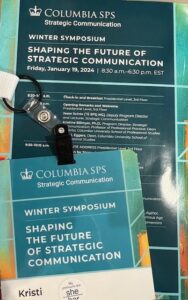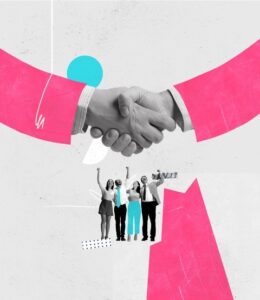
This blog series addresses some common misconceptions about consulting and executive coaching. Visit the CommsLede blog or my LinkedIn page for more…
Misconception 6: Consultants and executive coaches have the flexibility to choose who they work with and when.
I’m on the fence about this misconception, since I think this really depends on the business climate in which you’re operating.
Over the last decade, CommsLede’s consulting and coaching business has come in as a deluge, a trickle, and somewhere in the middle. I’ve worked busily on my own, I’ve hired other experts to partner with me to share the load, and I’ve also worked as a subcontractor, partnering with outstanding peers in the same space.
While business uncertainty can be hedged by marketing, networking, and client pipeline development, elements beyond a consultant’s control — like budget increases or cuts, clients transitioning roles or moving to new companies, organizational changes and downsizing, or shifts in the global economy – all impact a consultant and executive coach’s workstream and income.
Plain and simple: No matter how talented a consultant or executive coach is, or how much their clients value their work, uncertainty tends to be the name of the game.
And, as I’ve previously shared … when consultants or coaches don’t work steadily, they don’t get paid steadily, while their fixed operating costs tend to remain the same (see previous post). (Most independent consultants and coaches don’t have unemployment or severance packages to rely on to bridge these gaps.)
Agility and Planning is Key
When I launched my consulting practice, I took every project that came my way. Beyond my former employer, I hadn’t established the credibility to be choosy about clients or work, and I needed to:
- Cover start-up costs and eventually earn a salary
- Build the CommsLede brand and grow my portfolio of clients
- Clearly identify and demonstrate skill and case studies in the communication specialties in which I wanted to work (comms strategy, internal/employee comms and engagement, executive comms, change comms and comms coaching and development)
- Build a trusted bench of partners (designers, peers, a lawyer, an accountant, a website builder, etc.)
Once my consultancy became more established, I could be more selective about the projects I took and the clients I supported.
Then, COVID hit. Budgets were slashed, and contracts were cancelled overnight, and yet comms pros were in demand. I adjusted my workload and took on new clients.
When things stabilized post-pandemic, I expanded my service portfolio by going back to school and earning my formal certification in organizational performance coaching. This strategic investment came with a price tag and a decrease in salary, (since my school time took time away from my consulting hours). But this work also diversified CommsLede’s portfolio of offerings while formally growing my own skillset in an area that I’d always been curious and deeply passionate about.
While my business decisions are always grounded in my values and my business priorities, I try to remain agile and accept the general state of uncertainty that is consulting. For a Type-A person, this is my biggest challenge. I still find it difficult to predict the ebbs and flows of business. I do my best to manage things well in the busy times to cover the leaner, more unpredictable times. But I’d be the first to admit that waiting out the slow times (or managing a deluge!) can be a challenge.
And when client work slows down, I don’t hit the links or head to the beach. Instead, I hit my desk hard every day, investing in CommsLede. I build new relationships. I learn, read, and write as much as I can. I refine my skills and collect industry best practices.
So, when it’s “go-time,” my skills are current, relevant, and I’m ready to bring my best game (and positive energy) to the table.
All this is to say that if you hope to maintain a steady income as an independent consultant or executive coach in a volatile business environment, the flexibility with whom or when you work may be less than you think. Flexibility is often based on your ability to predict, assess and tolerate risk and uncertainty. As a small business owner, sometimes that flexibility is your tradeoff.
With more than two decades of communications experience spanning agencies, Fortune-100 organizations, non-profits and academia, Kristi Hinck Mills brings her passion for communications to CommsLede Consulting, where she delivers strategic solutions and executive coaching for her clients. Visit the CommsLede blog for more tips.



